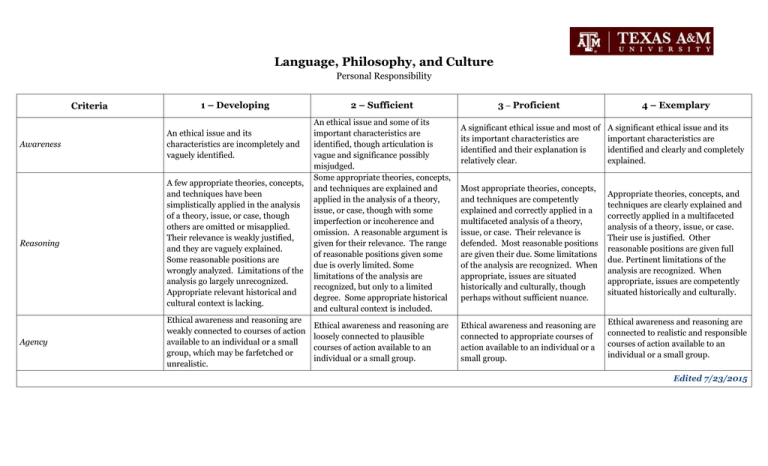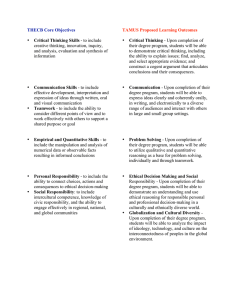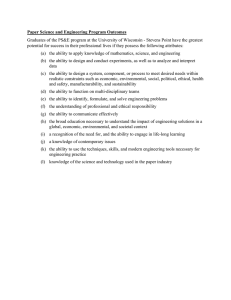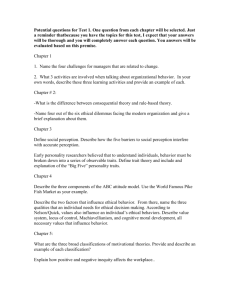Language, Philosophy, and Culture Personal Responsibility 1 – Developing
advertisement

Language, Philosophy, and Culture Personal Responsibility Criteria 1 – Developing Awareness An ethical issue and its characteristics are incompletely and vaguely identified. Reasoning A few appropriate theories, concepts, and techniques have been simplistically applied in the analysis of a theory, issue, or case, though others are omitted or misapplied. Their relevance is weakly justified, and they are vaguely explained. Some reasonable positions are wrongly analyzed. Limitations of the analysis go largely unrecognized. Appropriate relevant historical and cultural context is lacking. Agency Ethical awareness and reasoning are weakly connected to courses of action available to an individual or a small group, which may be farfetched or unrealistic. 2 – Sufficient An ethical issue and some of its important characteristics are identified, though articulation is vague and significance possibly misjudged. Some appropriate theories, concepts, and techniques are explained and applied in the analysis of a theory, issue, or case, though with some imperfection or incoherence and omission. A reasonable argument is given for their relevance. The range of reasonable positions given some due is overly limited. Some limitations of the analysis are recognized, but only to a limited degree. Some appropriate historical and cultural context is included. Ethical awareness and reasoning are loosely connected to plausible courses of action available to an individual or a small group. 3 ‒ Proficient 4 – Exemplary A significant ethical issue and most of its important characteristics are identified and their explanation is relatively clear. A significant ethical issue and its important characteristics are identified and clearly and completely explained. Most appropriate theories, concepts, and techniques are competently explained and correctly applied in a multifaceted analysis of a theory, issue, or case. Their relevance is defended. Most reasonable positions are given their due. Some limitations of the analysis are recognized. When appropriate, issues are situated historically and culturally, though perhaps without sufficient nuance. Appropriate theories, concepts, and techniques are clearly explained and correctly applied in a multifaceted analysis of a theory, issue, or case. Their use is justified. Other reasonable positions are given full due. Pertinent limitations of the analysis are recognized. When appropriate, issues are competently situated historically and culturally. Ethical awareness and reasoning are connected to appropriate courses of action available to an individual or a small group. Ethical awareness and reasoning are connected to realistic and responsible courses of action available to an individual or a small group. Edited 7/23/2015 Language, Philosophy, and Culture Courses in this category focus on how ideas, values, beliefs, and other aspects of culture express and affect human experience. Courses involve the exploration of ideas that foster aesthetic and intellectual creation in order to understand the human condition across cultures. Core Objectives Critical Thinking Skills: To include creative thinking, innovation, inquiry, and analysis, evaluation and synthesis of information Communication Skills: To include effective development, interpretation and expression of ideas through written, oral and visual communication Personal Responsibility: To include the ability to connect choices, actions and consequences to ethical decision-making Social Responsibility: To include intercultural competence, knowledge of civic responsibility, and the ability to engage effectively in regional, national, and global communities





